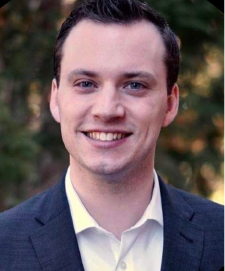Jordan Broberg
Research Project Focus
Now as a postdoc at UBC, I’ve transitioned from studying joint replacements using X-ray to studying cartilage and meniscus biomechanics with MRI.
Career Update
LinkedIn profile
Transdisciplinary Research Award Winner
Research Title: An integrated evaluation of surgical techniques and devices for total knee arthroplasty using imaging and sensor systems.
- 2019: $4,750.00
- 2020: $5,000.00
- 2021: $5,000.00
Looking back...
My interest in musculoskeletal health began after experiencing a few sports-related injuries in high school. Later in undergrad, I had the opportunity to choose a research project, and I specifically sought out Dr. Teeter's lab because of my interest in musculoskeletal health. I enjoyed the work so much that I decided to continue with Dr. Teeter for my graduate studies, which led me to join the Bone and Joint Institute and the CMHR program.
Value of the BJI & CMHR research environment and support...
The CMHR program played a key role in my career development by fostering an interdisciplinary approach that allowed me to collaborate with experts from various fields. This broadened my perspective on musculoskeletal health, as I was able to integrate knowledge from areas such as biomechanics, biology, medical imaging, and patient advocacy. The diverse backgrounds of both the faculty and fellow trainees enriched my learning experience, providing insights that have been invaluable to my work.
What I appreciated most was the camaraderie within the program. Being part of a tight-knit group of trainees who were equally passionate about improving health outcomes created an inspiring environment. The support and shared sense of purpose made the challenges of research more manageable and the successes more rewarding. This collaborative spirit has stayed with me throughout my career, shaping how I approach teamwork and interdisciplinary projects today.
Receiving the Transdisciplinary Research Training Award (TRTA) from the Bone and Joint Institute allowed me to attend several key conferences, where I was able to present my work, gain feedback, and network with leading experts in musculoskeletal health. These experiences not only broadened my knowledge but also helped me establish connections that have been invaluable for collaboration and professional development.
The opportunity to travel to conferences also exposed me to cutting-edge research and new methodologies that I’ve since integrated into my own work. This has been pivotal in refining my research approach and expanding my perspective on interdisciplinary collaboration. Overall, the TRTA funding greatly enhanced my career by providing both academic and networking opportunities that I wouldn’t have had otherwise.
Now as a postdoc at UBC, I’ve transitioned from studying joint replacements using X-ray to studying cartilage and meniscus biomechanics with MRI. The CMHR program was instrumental in preparing me for this shift by providing exposure to the biology of musculoskeletal structures, including cartilage, as well as foundational knowledge in biomechanics and imaging.
The CMHR program was instrumental in preparing me for this shift by providing exposure to the biology of musculoskeletal structures, including cartilage, as well as foundational knowledge in biomechanics and imaging.
Through interactions with engineers, scientists, and clinicians, I developed a more holistic understanding of the field, which enhanced my ability to tackle complex research questions. These collaborative experiences, supported by the CMHR program, empowered me to explore new topics in musculoskeletal health with a comprehensive perspective.
Advice for current and future trainees...
One of the greatest strengths of the CMHR program is its emphasis on collaboration across disciplines. Engage with engineers, clinicians, and fellow researchers early on to broaden your perspective and deepen your understanding of MSK health. These connections can lead to innovative research ideas and practical applications. And don’t hesitate to reach out for guidance from mentors in the program. Their insights and experiences can provide valuable direction and support as you navigate your research journey.


